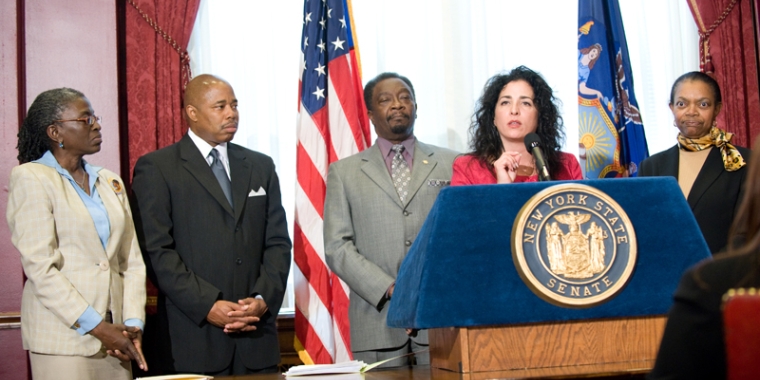Legislators and Human Rights Activists Hail the Passage of Legislation to End Barbaric Practice of Shackling Incarcerated Pregnant Women
Diane J. Savino
May 20, 2009
-
COMMITTEE:
- Civil Service and Pensions

Albany, NY (May 20, 2009): Human rights advocates and champions of criminal justice reform joined today
with sponsors of the “Anti Shackling Bill” (S.1290-A/A.3373-A) to hail the Senate and Assembly’s passage
of legislation that prohibits the inhumane practice of shackling pregnant inmates who are in labor. The
announcement was made at the State Capitol in Albany, New York.
The “Anti-Shackling Bill” is sponsored by Senator Velmanette Montgomery (D-Brooklyn) and Assemblyman Nick Perry (D-Brooklyn).
Their bill prohibits state and local correctional authorities from using restraints on a pregnant female inmate who is being transported for childbirth, during labor and delivery, and in post-natal recovery. An exception to this rule is made under extraordinary circumstances where restraints are determined to be necessary to prevent the woman from injuring herself, medical or correctional personnel. In these instances, a pregnant woman may be cuffed by one wrist.
“This practice is barbaric and unconscionable,” said Senator Montgomery, noting that among the women incarcerated in New York State prison during 2007 and 2008, 61 and 69 were pregnant, respectively. Montgomery, who chairs the Senate Committee on Children and Families, said that the use of shackles presents a grave health risk for both the mother and her unborn child.”
The American College of Obstetricians and Gynecologists and the American Public Health Association have condemned the practice of shackling, recognizing that it compromises women’s health and causes severe pain and trauma. The Center for Reproductive Rights points out that unrestrained movement is critical during labor, delivery, and the post-delivery recovery period. Shackles hamper a woman’s ability to move to alleviate the pain of her contractions, which increases stress on the woman’s body and may decrease the flow of oxygen to her fetus.
Since 2000, four states - California, Illinois, Vermont and New Mexico - have passed legislation restricting the unnecessary use of restraints on pregnant women in prison. “Our State must join ranks with other leaders in the fight for human rights and support healthy pregnancies and deliveries for all New Yorkers,” declared Senator Montgomery.
"While the Department of Correction has expressed that they are somewhat sensitive to the inappropriateness of shackling women during labor, the fact that this practice is still an option that is available creates a sense of concern that needs to be addressed," said Assemblyman N. Nick Perry. "This legislation takes that option off the table, and ensures that women in labor will not have to endure the health risk and the indignity of being shackled as they bring their newborn into this world.”
Senator Montgomery, Assembly Perry and their legislative colleagues Senator Diane Savino (D-Staten Island/Brooklyn), Senator Eric Adams (D-Brooklyn) and Assemblywoman Inez D. Barron were joined at the press conference by representatives of the Correctional Association of New York, The Center for Reproductive Rights, Human Rights Watch, and M. Tracey Brooks, President and CEO of Family Planning Advocates of New York State, as well as several formerly incarcerated women who were pregnant while in prison.
“Restricting the use of restraints on incarcerated women in labor will not jeopardize the safety of correctional or medical staff. Revising New York’s statute will provide clear guidance for state and local correctional facilities and eliminate inconsistencies in shackling policies across the state. The Montgomery/Perry bill takes a critical step toward ensuring safe and humane treatment for women in prison and their babies,” Serena Alfieri, Associate Director of Policy Women in Prison Project, The Correctional Association of New York.
“It is long past time for New York to end this inhumane practice. Childbirth can be difficult under the best of circumstances; this practice is not only degrading, but dangerous to the mother and child. The idea of a woman bolting and fleeing in the midst of childbirth is ludicrous and should not be used as an excuse,” said Senator Diane Savino (D-Staten Island/Brooklyn).
"There are certain practices that have no place in a society that respects human rights. The shackling of pregnant women is one of them. Today, New York legislators can set an example for the rest of the country and declare that this dangerous and degrading practice will not be tolerated here,” said Meghan Rhoad, Women's Rights Division, Human Rights Watch.
“Shackling pregnant women is a dangerous and inhumane practice that belongs in the Dark Ages,” said Senator Eric Schneiderman (D-Manhattan/Bronx). “There's a reason obstetricians are so strongly opposed to this practice. The use of restraints on women in labor is not only cruel, it poses serious and unnecessary risks to the health of both the mother and her child. We have a responsibility to ensure the well-being of newborn babies is protected, no matter where they happen to be born.”
“As a former practicing nurse and the Chairwoman of the Senate Committee on Crime Victims, Crime and Correction, I am in full support of this legislation to end the dangerous and degrading shackling of pregnant inmates in labor. Restraining women during labor is inhumane and rarely necessary in terms of security. I commend my colleagues for addressing this important women’s healthcare issue,” said Senator Ruth Hassell-Thompson (D-Bronx/Westchester).
Senator Montgomery and Assembly Perry were joined at the press conference by representatives of the Correctional Association of New York, The Center for Reproductive Rights, Human Rights Watch, and M. Tracey Brooks, President and CEO of Family Planning Advocates of New York State, as well as several formerly incarcerated women who were pregnant while in prison. Senate and Assembly co-sponsors of the bill were also in attendance in support of the bill’s passage.
###
Share this Article or Press Release
Newsroom
Go to NewsroomSenator Savino 2022 Woman of Distinction
August 26, 2022

Senator Savino 2022 Veteran Hall of Fame
May 30, 2022

Senator Savino 2021 Woman of Distinction
August 27, 2021
